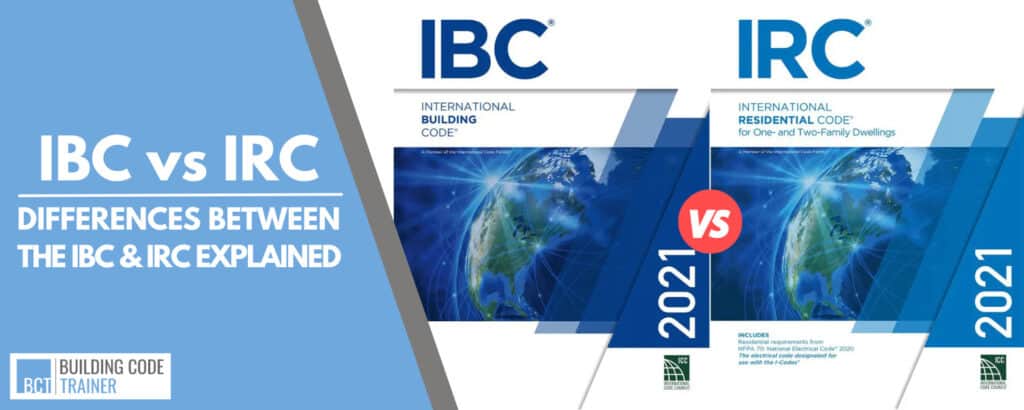Author : Building Code Trainer

IBC or IRC, that is the question.
The International Code Council (ICC) publishes a variety of model codes. Two of these code books I would like to talk about is the International Building Code (IBC) and the International Residential Code (IRC).
Many people get these two confused and that is quite common. Many times I hear people explain it such that the International Building Code (IBC) is the code book for commercial construction and the International Residential Code (IRC) is the code book for residential construction. This is NOT true.
It is important to know which code book your project is subject to so that the correct regulations are applied. In order to understand this, we must look to the code book themselves.
IBC Scoping vs. IRC Scoping
First off lets look at the International Residential Code (IRC). In order to understand what type of projects fall under the IRC, we must take a look at the scoping section within chapter 1.
Scope of the 2021 International Residential Code (IRC)
Section R101.2 specifies that the provisions of the International Residential Code (IRC) shall apply to detached one-and-two family dwellings and townhouses not more than three stories above grade plane in height with a separate means of egress and their accessory structures not more than three stories above grade plane in height.

By this code section you can see what falls under the scope of the International Residential Code (IRC) provisions. As for the International Building Code (IBC), let us look at the scoping section within chapter 1 of the IBC.
Scope of the 2021 International Building Code (IBC)
Section 101.2 specifies that the provisions of the International Building Code (IBC) shall apply to every building or structure or any appurtenances connected or attached to such buildings or structures.
As you can see the scope of this code covers every building, however there is an EXCEPTION. The exception states the following:
Detached one-and-two family dwellings and townhouses not more than three stories above grade plane in height with a separate means of egress and their accessory structures not more than three stories above grade plane in height shall comply with the International Residential Code (IRC).
Therefore you can see that the International Building Code (IBC) covers all types of buildings other than those buildings that are subject to the International Residential Code (IRC). For example a detached residential 2-family dwelling structure is subject to the IRC while a detached residential 3-family dwelling structure (not a townhouse) is subject to the IBC.
Another example is a townhouse. A townhouse 3 stories above grade plane is subject to the provisions of the International Residential Code (IRC) while a townhouse 4 stories above grade plane is subject to the provisions of the International Building Code (IBC).
You can see in these examples that residential projects can be subject to the IBC if the project falls outside of the IRC provisions.
When a building does not conform to the prescriptive provisions of the IRC, the building and/or structure is then beyond the scope of the code and the provisions of the IRC cannot be applied and therefore the building must then meet the provisions of the IBC.
Intent of the Code
While the provisions of each code can differ, the intent or purpose of the code is the same: To establish the minimum requirements to provide a reasonable level of public safety, public health, general welfare, and safety to life and property from fire and other hazards attributed to the built environment and to provide safety to fire fighters and emergency responders during emergency operations.
In Summary
The International Residential Code (IRC) applies to the following:
1. Detached one-and-two family dwellings
2. Townhouses not more than three stories above grade plane in height with a separate means of egress.
3. Accessory structures to IRC structures not more than three stories above grade plane in height.
The International Building Code (IBC) applies to all buildings or structures that do not conform to the prescriptive provisions of the International Residential Code (IRC).
Related Articles to Read:
- What is an ICC Certification & How to Get ICC Certified
- 15 Essential Reference Books Every Code Official Needs
- What Building Codes Apply to a Tiny House?
About the Author

Building Code Trainer
AuthorThis site is run and maintained by a Certified Building Official, Plans Examiner, and Inspector. With a Bachelors of Science Degree in Construction Engineering along with holding multiple ICC certifications, the Author of this site has over 15 years of experience within the construction industry.
